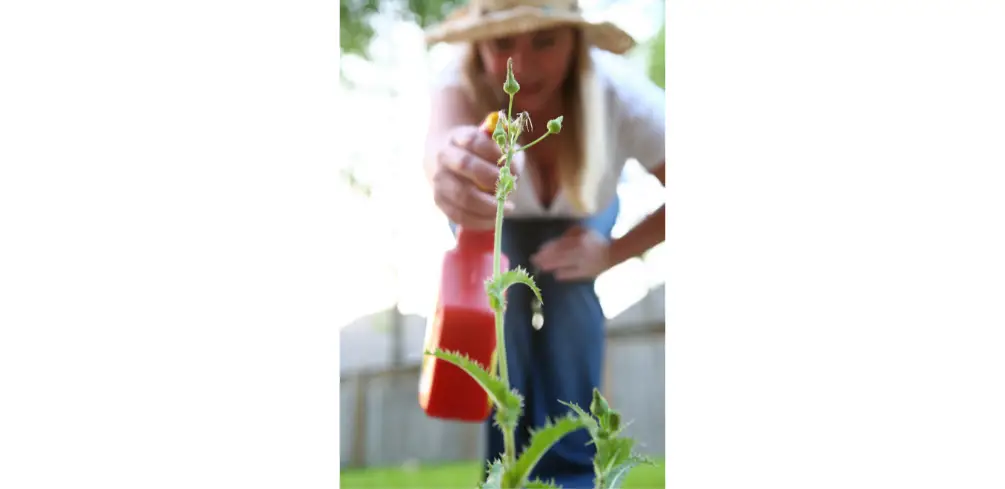It’s no secret that we all want to maintain a pristine and picturesque garden free of pesky weeds.
We often turn to various weed killers to help us achieve that perfect lawn or flowerbed.
However, have you ever stopped to consider the potential effects these chemicals might have on the adorable hedgehogs that call your backyard home?
Hedgehogs are fascinating creatures with an important role in our ecosystem, and their population is already under threat due to habitat loss and other human activities.
It’s about time we take a closer look at whether the products we use in our gardens could be harming these spiky little friends.
So grab a cup of tea and settle in as we explore this intriguing question – does weed killer harm hedgehogs?
Types Of Weed Killers And Their Ingredients
Weed killers, or herbicides, come in various forms and compositions. Understanding the ingredients in these products is essential for determining their potential impact on hedgehogs and other wildlife.
Some weed killers are made from synthetic chemicals like glyphosate, which is the most common ingredient found in many commercial herbicides. Others are formulated with natural substances such as vinegar, salt, and citric acid.
These natural herbicides tend to be less harmful to non-target organisms and can often be a safer alternative for gardeners who want to protect their local wildlife.
Now that we’ve established some of the basics around weed killer composition, let’s dive deeper into how these products may affect hedgehogs.
Synthetic chemical-based herbicides have been known to cause harm to various organisms due to their toxic nature. While it’s true that these chemicals are designed primarily to target specific plants, they can still pose a risk to other living beings through direct or indirect exposure.
On the other hand, natural herbicides generally carry a lower risk of harming hedgehogs and other wildlife since they’re derived from organic sources and break down more quickly in the environment. However, it’s important to remember that even natural solutions can still have negative impacts if not used mindfully and in moderation.
Effects Of Chemicals On Hedgehog Health
It’s not uncommon for our spiky little friends to find themselves in need of some tender loving care. Hedgehog rehabilitation centers see many cases where these adorable creatures have been harmed by human actions, including exposure to harmful chemicals like weed killers.
It’s important that we understand how these substances impact hedgehogs and their overall well-being in order to create a safer environment for them.
When it comes to chemical exposure symptoms, hedgehogs can experience a range of health issues that might not be immediately apparent. These can include difficulty breathing, loss of appetite, lethargy, and even seizures.
In some cases, prolonged exposure or ingestion of toxic chemicals may lead to long-term health problems or even death. By being mindful of the products we use in our gardens and outdoor spaces, we can help protect hedgehogs and ensure they continue to thrive in their natural habitat.
Alternative Methods For Weed Control
Who doesn’t love hedgehogs? These little creatures deserve a safe and healthy environment, free from toxic chemicals like weed killer. The good news is that you can still maintain a beautiful garden without harming hedgehogs by using natural remedies and organic alternatives for weed control.
Let’s explore some eco-friendly options that not only protect our spiky friends but also contribute to a healthier planet.
- Mulching: A fantastic way to suppress weeds is by laying down a layer of organic mulch around your plants. This can be straw, wood chips, or even old newspapers. Mulching prevents sunlight from reaching the soil, making it more challenging for weeds to grow while retaining moisture and improving soil health.
- Hand-pulling: Get your hands dirty and pull out those pesky weeds manually! It may require some effort, but it’s an effective way to keep your garden weed-free without resorting to harmful chemicals.
- Boiling water: Believe it or not, pouring boiling water on weeds will kill them almost instantly. It’s a simple yet powerful method that doesn’t harm the environment or our beloved hedgehogs.
So go ahead, give these eco-friendly methods a try and watch your garden flourish as nature intended! Not only will you be creating a safer haven for hedgehogs, but you’ll also feel great knowing that you’re contributing positively to the environment by avoiding harmful chemicals in your outdoor space.
Embrace these natural remedies and organic alternatives for a greener future!
Protecting Hedgehogs In Your Garden
As we’ve explored alternative methods for weed control, it’s crucial to consider the impact of our gardening practices on the local wildlife, particularly hedgehogs. These charming creatures play a vital role in maintaining a healthy ecosystem by consuming various pests like slugs and snails during their nocturnal feeding sessions.
So, how can we ensure that our gardens remain a safe haven for these spiky little friends?
To protect hedgehogs in your garden, start by creating hedgehog-friendly habitats such as log piles, leaf piles, or designated areas with dense shrubbery where they can seek shelter and hibernate.
Avoid using harmful chemicals like weed killers and slug pellets, which pose significant risks to their health. Instead, opt for organic alternatives or manual weed removal techniques mentioned earlier.
Additionally, provide access points in your garden fences for them to roam freely during their nocturnal feeding excursions.
By adopting these simple measures, you’ll not only create a thriving environment for hedgehogs but also contribute to preserving the delicate balance of nature within your green space.
Raising Awareness And Promoting Wildlife-Friendly Gardening Practices
Imagine strolling through your garden, the sun gently warming your face, as you observe a cute little hedgehog happily foraging among the foliage. This heartwarming scene is becoming increasingly rare due to factors like hedgehog habitat loss and the use of harmful chemicals in gardening practices.
By raising awareness and promoting wildlife-friendly gardening methods, we can contribute to protecting these adorable creatures and creating a healthy environment for all living beings.
Here are four simple steps you can take to make your garden more hedgehog-friendly:
- Opt for organic: Embrace organic gardening benefits such as healthier soil, improved biodiversity, and reduced risk of toxic substances harming wildlife like hedgehogs.
- Create safe havens: Provide sheltered areas like piles of leaves or purpose-built hedgehog houses where they can safely nest and hibernate.
- Offer food and water: Set out a shallow dish of water and supplementary food like cat biscuits or meaty pet food (avoid milk or bread) for hungry hedgehogs.
- Avoid hazards: Keep an eye on any potential dangers in your garden such as uncovered drains, steep slopes or ponds with no escape routes.
By implementing these simple yet effective measures in our gardens, we not only help protect vulnerable species like hedgehogs but also contribute to building vibrant ecosystems that support various forms of life. It’s important to remember that our actions have a significant impact on the natural world around us; let’s strive to create harmonious spaces where humans and wildlife can coexist peacefully.
Conclusion
In conclusion, it’s essential that we consider the potential harm weed killers can cause to hedgehogs and other wildlife. By exploring alternative methods of weed control and practicing wildlife-friendly gardening techniques, we can help protect these creatures and maintain a healthy ecosystem in our gardens.
Let’s all do our part in raising awareness about the dangers of chemical weed killers and promote safer, more sustainable practices to ensure a brighter future for our beloved hedgehogs and the environment as a whole.

